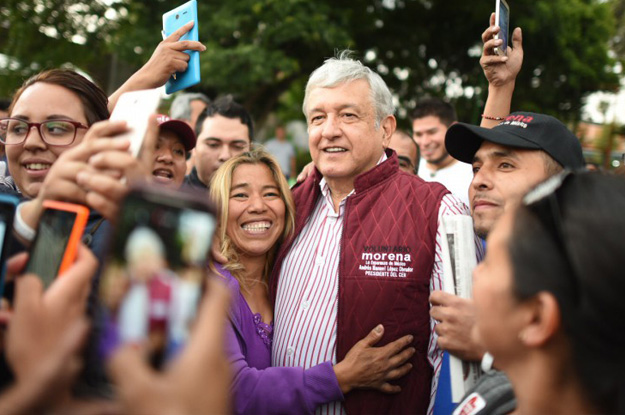This story has been updated, and a correction has been appended below.
Attack ads comparing Andrés Manuel López Obrador to the late Hugo Chávez helped sink his first bid for the Mexican presidency over a decade ago. Now, with 14 months to go until the 2018 presidential election, he is once again the front-runner and charges of sympathizing with the Venezuelan government are coming thick and fast.
Thinking ahead to the national election and with a bellwether June 4 governor’s race in Mexico state fast approaching, his opponents at home and abroad have wasted little time in reviving the tactic and casting the leader of the leftist Morena party as a volatile populist intent on upending the political order.
Enrique Ochoa Reza, the president of the ruling Institutional Revolutionary Party (PRI), recently told voters in Mexico state, “We can’t let Mexico end up like Venezuela,” and warned them against what he called Morena’s “dark cavern of populism.”
The National Review, a conservative U.S. publication, called López Obrador a “Hugo Chávez wannabe” in January, and former president Felipe Calderón has criticized what he called López Obrador’s “complicit silence” concerning the political and humanitarian crises in Venezuela. López Obrador’s critics have also called out Twitter posts in which Yeidckol Polevnsky, Morena’s secretary general, expressed support for Venezuelan President Nicolás Maduro.
The comparisons are so frequent López Obrador has come to anticipate them: asked “why Mexicans hate him” during a May 8 interview with Univision’s Jorge Ramos, López Obrador said, “I never met Chávez … I don’t know Maduro.”
López Obrador, or AMLO as he is known, has good reason to be wary. Comparisons to Chávez ahead of Mexico’s 2006 presidential election helped erase what had been a comfortable lead for the then-candidate. The issue continued to haunt López Obrador’s 2012 presidential campaign, though it was less prominent.
Despite their impact in the past, experts doubt whether comparisons to chavismo will work in what is now a markedly different political environment. The leftist groundswell that Latin America experienced in 2006 has largely retreated. Voters have other priorities, and many believe that heightened concern over corruption favors López Obrador.
“I don’t think that the narrative comparing Chávez and López Obrador and accusing him of being a populist works anymore,” said José Antonio Crespo, a political scientist at Mexico City’s Center for Research and Teaching in Economics (CIDE). “The sector of moderate voters that’s fed up with the PRI and PAN (National Action Party) and wants to try something new isn’t afraid of López Obrador.”
There’s also the question of whether these attacks are – or ever were – warranted. Carlos Bravo Regidor, a historian at CIDE, said that comparisons between López Obrador and Chávez ignore significant differences between the two.
López Obrador is generally critical of privatization and free trade, and has pledged to hold a referendum on Mexico’s recent opening of the energy sector to foreign investment should he win. But he was a mostly pragmatic mayor of Mexico City from 2000 to 2005, working with the private sector to restore downtown and invest in housing. Also, his tenure as mayor was part of a long career in politics that Chávez, a lieutenent colonel in the army before becoming president, lacked, Bravo noted.
“López Obrador represents something different than Chávez,” Bravo told AQ. “There are grounds not to like him, for sure, but the Chávez comparison has no grounds.”
Some of López Obrador’s opponents point to a column written in March by John Ackerman, a journalist and prominent AMLO supporter, that called Venezuela “much more democratic and respectful of human rights than Mexico.” While the piece referenced neither Maduro nor López Obrador, it was used by critics (including Calderón) as proof of the Mexican candidate’s proclivity for chavismo.
Ackerman, who accompanied López Obrador on his visit to Washington earlier this year but told AQ he does not hold any formal position in Morena and does not speak for the candidate, said that comparisons between Chávez and López Obrador are “spurious” and “ridiculous.”
“Not once has López Obrador cited Chávez or Maduro or Venezuela as an example to follow in terms of economic policies,” Ackerman said. “These are scare tactics being used by the political opposition, and not only opposition to him in Mexico, but also internationally.”
Still, some experts believe that perceptions of López Obrador’s views on Venezuela could carry weight with more conservative voters. When journalist Ciro Gómez Leyva asked López Obrador on his television program why he hadn’t spoken out against the repression of protesters in Venezuela over the past month, López Obrador called for dialogue and encouraged non-violent means of protest – a disappointing answer for those hoping he would condemn the Maduro government’s tactics.
Ultimately, the AMLO-Chávez association’s effect is “unpredictable,” said Alejandro Alvarado Bremer, a communications professor at Florida International University and an expert on political reputations and campaigns.
López Obrador is near the top of most early polls, but given the unreliability of polling and the changing ways voters get their news, the jury is still out on whether the associations with Chávez and Maduro will resonate enough to stop his momentum.
“We are in the age of marketing politics, and it has a lot to do with people’s perceptions, not just with the reality of what things are.”
A previous version of this story misstated Hugo Chávez’s military ranking.
This story was updated on May 11 to include further discussion of policy differences between López Obrador and Chávez.
—
O’Boyle is an editor for Americas Quarterly









